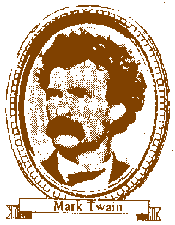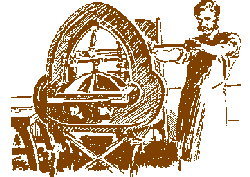Excerpts from Roughing It Mark Twain goes to work at the Territorial Enterprise |  |
I would have challenged the publisher in the "blind lead" days -- I wanted to fall down and worship him, now Twenty-Five Dollars a week -- it looked like bloated luxury -- a fortune -- a sinful and lavish waste of money. But my transports cooled when I thought of my inexperience and consequent unfitness for the position -- and straightway, on rap of this, my long array of failures rose up before me. Yet if I refused this place I must presently become dependent upon somebody for my bread, a thing necessarily distasteful to a man who had never experienced such a humiliation since he was thirteen years old. Not much to be proud of, since it is so common -- but then it was all I had to be proud of. So I was scared into being a city editor. I would have declined, Otherwise Necessity is the mother of "taking chances." I do not doubt that if, at that time, I had been offered a salary to translate the Talmud from the original Hebrew, I would have accepted -- albeit with diffidence and some misgivings -- and throw as much variety into it as I could for the money.
I went up to Virginia and entered upon my new vocation. I was a rusty looking city editor, I am free to confess -- coatless, slouch hat, blue woolen shirt, pantaloons stuffed into boot-tops, whiskered half down to the waist, and the universal navy revolver slung to my belt. But l secured a more Christian costume and discarded the revolver. I had never had occasion to kill anybody, nor ever felt a desire to do so, but had worn the thing in deference to popular sentiment, and in order that I mighr not, by its absence, be offensively conspicuous, and a subject of remark. But the other editors, and all the printers, carried revolvers. I asked the chief editor and proprietor (Mr. Goodman, I will call him, since it describes him as well as any name could do) for some instructions with regard to my duties and he told me to go all over town and ask all sorts of people all sorts of questions, make notes of the information gained, and write them out for publication. And he added:
"Never say 'We learn' so-and-so, or 'It is reported,' or 'It is rumored,' or 'We understand' so-and-so, but go to headquarters and get the absolute facts, and then speak out and say 'It is so-and-so.' Otherwise, people will not put confidence in your news. Unassailable certainty is the thing that gives a newspaper the firmest and most valuable reputation."
It was the whole thing in a nutshell; and to this day when I find a reporter commencing his article with "We understand," I gather a suspicion that he has not taken as much pains to inform himself as he ought to have done. I moralize well, but I did not always practice well when I was a city editor; I let fancy get the upper hand of fact too often when there was a dearth of news. I can never forget my first day's experience as a reporter. I wandered about town questioning everybody, boring everybody, and finding out that nobody knew anything. At the end of five hours my notebook was still barren. I spoke to Mr. Goodman. He said:
"Dan used to make a good thing out of the hay wagons in a dry time when there were no fires or inquests. Are there no hay wagons in from the Truckee? If there are, you might speak of the renewed activity and all that sort of thing, in the hay business, you know. It isn't sensational or exciting, but it fills up and looks business like."
I canvassed the city again and found one wretched old hay truck dragging in from the country. But I made affluent use of it. I multiplied it by sixteen, brought it into town from sixteen different directions, made sixteen separate items out of it, and got up such another sweat about hay as Virginia City had never seen in the world before.
This was encouraging. Two nonpareil columns had to be filled, and I was getting along. Presently, when things began to look dismal again, a desperado killed a man in a saloon and joy returned once more. I never was so glad over any mere trifle before in my life. I said to the murderer:
"Sir, you are a stranger to me, but you have done me a kindness this day which I can never forget. If whole years of gratitude can be to you any slight compensation, they shall be yours. I was in trouble and you have relieved me nobly and at a time when all seemed dark and drear. Count me your friend from this time forth, for I am not a man to forget a favor."
If I did not really say that to him I at least felt a sort of itching desire to do it. I wrote up the murder with a hungry attention to details, and when it was finished experienced one regret -- namely, that they had not hanged my benefactor on the spot, so that I could work him up too. --Mark Twain

